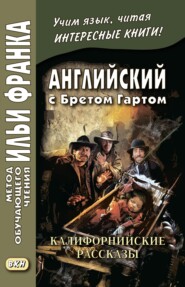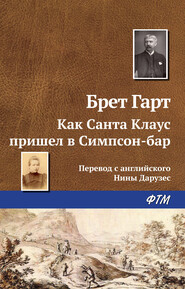По всем вопросам обращайтесь на: info@litportal.ru
(©) 2003-2024.
✖
Gabriel Conroy
Автор
Год написания книги
2017
Настройки чтения
Размер шрифта
Высота строк
Поля
The door closed on his astonished face. "It's all – a – mistake," said Dumphy, when he had gone. "They died of starvation – all of them – while I was away hunting help. I've read the accounts."
Colonel Starbottle slowly drew from some vast moral elevation in his breast pocket a well-worn paper. It proved when open to be a faded, blackened, and be-thumbed document in Spanish. "Here is the report of the Commander of the Presidio who sent out the expedition. You read Spanish? Well. The bodies of all the other women were identified except your wife's. Hang it, my boy, don't you see why she was excepted? She wasn't there."
The Colonel darted a fat forefinger at his host and then drew back, and settled his purpled chin and wattled cheeks conclusively in his enormous shirt collar. Mr. Dumphy sank back in his chair at the contact as if the finger of Fate had touched him.
CHAPTER V.
MRS. CONROY HAS AN UNEXPECTED VISITOR
The hot weather had not been confined to San Francisco. San Pablo Bay had glittered, and the yellow currents of the San Joaquin and Sacramento glowed sullenly with a dull sluggish lava-like flow. No breeze stirred the wild oats that drooped on the western slope of the Contra Costa hills; the smoke of burning woods on the eastern hillsides rose silently and steadily; the great wheat fields of the intermediate valleys clothed themselves humbly in dust and ashes. A column of red dust accompanied the Wingdam and One Horse Gulch stage-coach, a pillar of fire by day as well as by night, and made the fainting passengers look longingly toward the snow-patched Sierras beyond. It was hot in California; few had ever seen the like, and those who had were looked upon as enemies of their race. A rashly scientific man of Murphy's Camp who had a theory of his own, and upon that had prophesied a continuance of the probable recurrence of the earthquake shock, concluded he had better leave the settlement until the principles of meteorology were better recognised and established.
It was hot in One Horse Gulch – in the oven-like Gulch, on the burning sands and scorching bars of the river. It was hot even on Conroy's Hill, among the calm shadows of the dark-green pines – on the deep verandahs of the Conroy cottage orné. Perhaps this was the reason why Mrs. Gabriel Conroy, early that morning after the departure of her husband for the mill, had evaded the varnished and white-leaded heats of her own house and sought the more fragrant odours of the sedate pines beyond the hilltop. I fear, however, that something was due to a mysterious note which had reached her clandestinely the evening before, and which, seated on the trunk of a prostrate pine, she was now reperusing.
I should like to sketch her as she sat there. A broad-brimmed straw hat covered her head, that although squared a little too much at the temples for shapeliness, was still made comely by the good taste with which – aided by a crimping-iron – she had treated her fine-spun electrical blonde hair. The heat had brought out a delicate dewy colour in her usually pale face, and had heightened the intense nervous brightness of her vivid grey eyes. From the same cause, probably, her lips were slightly parted, so that the rigidity that usually characterised their finely chiselled outlines was lost. She looked healthier; the long flowing skirts which she affected, after the fashion of most petite women, were gathered at a waist scarcely as sylph-like and unsubstantial as that which Gabriel first clasped after the accident in the fateful cañon. She seemed a trifle more languid – more careful of her personal comfort, and spent some time in adjusting herself to the inequalities of her uncouth seat with a certain pouting peevishness of manner that was quite as new to her character as it was certainly feminine and charming. She held the open note in her thin, narrow, white-tipped fingers, and glanced over it again with a slight smile. It read as follows: —
"At ten o'clock I shall wait for you at the hill near the Big Pine! You shall give me an interview if you know yourself well. I say beware! I am strong, for I am injured! – Victor."
Mrs. Conroy folded the note again, still smiling, and placed it carefully in her pocket. Then she sat patient, her hands clasped lightly between her knees, the parasol open at her feet – the very picture of a fond, confiding tryst. Then she suddenly drew her feet under her, sideways, with a quick, nervous motion, and examined the ground carefully with sincere distrust of all artful lurking vermin who lie in wait for helpless womanhood. Then she looked at her watch.
It was five minutes past the hour. There was no sound in the dim, slumbrous wood, but the far-off sleepy caw of a rook. A squirrel ran impulsively halfway down the bark of the nearest pine, and catching sight of her tilted parasol, suddenly flattened himself against the bark, with outstretched limbs, a picture of abject terror. A bounding hare came upon it suddenly and had a palpitation of the heart that he thought he really never should get over. And then there was a slow crackling in the underbrush as of a masculine tread, and Mrs. Conroy, picking up her terrible parasol, shaded the cold fires of her grey eyes with it and sat calm and expectant.
A figure came slowly and listlessly up the hill. When within a dozen yards of her, she saw it was not Victor. But when it approached nearer she suddenly started to her feet with pallid cheeks and an exclamation upon her lips. It was the Spanish translator of Pacific Street. She would have flown, but on the instant he turned and recognised her with a cry, a start, and a passion equal to her own. For a moment they stood glaring at each other breathless but silent!
"Devarges!" said Mrs. Conroy, in a voice that was scarcely audible. "Good God!"
The stranger uttered a bitter laugh. "Yes! Devarges! – the man who ran away with you – Devarges the traitor! Devarges the betrayer of your husband. Look at me! You know me – Henry Devarges! Your husband's brother! – your old accomplice – your lover – your dupe!"
"Hush," she said, imploringly glancing around through the dim woods, "for God's sake, hush!"
"And who are you," he went on, without heeding her, "which of the Mesdames Devarges is it now? Or have you taken the name of the young sprig of an officer for whom you deserted me and maybe in turn married? Or did he refuse you even that excuse for your perfidy? Or is it the wife and accomplice of this feeble-minded Conroy? What name shall I call you? Tell me quick! Oh, I have much to say, but I wish to be polite, madame; tell me to whom I am to speak!"
Despite the evident reality of his passion and fury there was something so unreal and grotesque in his appearance – in his antique foppery, in his dyed hair, in his false teeth, in his padded coat, in his thin strapped legs, that this relentless woman cowered before him in very shame, not of her crime but of her accomplice! "Hush," she said, "call me your friend; I am always your friend, Henry. Call me anything, but let me go from here. For God's sake, do you hear? Not so loud! Another time and another place I will listen," and she drew slowly back, until, scarce knowing what he did, she had led him away from the place of rendezvous toward the ruined cabin. Here she felt that she was at least safe from the interruption of Victor. "How came you here? How did you find out what had become of me? Where have you been these long years?" she asked hastily.
Within the last few moments she had regained partially the strange power that she had always exerted over all men except Gabriel Conroy. The stranger hesitated, and then answered in a voice that had more of hopelessness than bitterness in its quality —
"I came here six years ago, a broken, ruined, and disgraced man. I had no ambition but to hide myself from all who had known me, from that brother whose wife I had stolen, and whose home I had broken up – from you – you, Julie! you and your last lover – from the recollection of your double treachery!" He had raised his voice here, but was checked by the unflinching eye and cautionary gesture of the woman before him. "When you abandoned me in St. Louis, I had no choice but death or a second exile. I could not return to Switzerland, I could not live in the sickening shadow of my crime and its bitter punishment. I came here. My education, my knowledge of the language stood me in good stead. I might have been a rich man, I might have been an influential one, but I only used my opportunities for the bare necessaries of life and the means to forget my trouble in dissipation. I became a drudge by day, a gambler by night. I was always a gentleman. Men thought me crazy, an enthusiast, but they learned to respect me. Traitor as I was in a larger trust, no one doubted my honour or dared to question my integrity. But bah! what is this to you? You!"
He would have turned from her again in very bitterness, but in the act he caught her eye, and saw in it if not sympathy, at least a certain critical admiration, that again brought him to her feet. For despicable as this woman was, she was pleased at this pride in the man she had betrayed, was gratified at the sentiment that lifted him above his dyed hair and his pitiable foppery, and felt a certain honourable satisfaction in the fact that, even after the lapse of years, he had proved true to her own intuitions of him.
"I had been growing out of my despair, Julie," he went on, sadly; "I was, or believed I was, forgetting my fault, forgetting even you, when there came to me the news of my brother's death – by starvation. Listen to me, Julie. One day there came to me for translation a document, revealing the dreadful death of him – your husband, my brother – do you hear? – by starvation! Driven from his home by shame, he had desperately sought to hide himself as I had – accepted the hardship of emigration – he, a gentleman and a man of letters – with the boors and rabble of the plains, had shared their low trials and their vulgar pains, and died among them, unknown and unrecorded."
"He died as he had lived," said Mrs. Conroy, passionately, "a traitor and a hypocrite; he died following the fortunes of his paramour, an uneducated, vulgar rustic, to whom, dying, he willed a fortune – this girl – Grace Conroy. Thank God, I have the record! Hush! what's that?"
Whatever it was – a falling bough or the passing of some small animal in the underbrush – it was past now. A dead silence enwrapped the two solitary actors; they might have been the first man and the first woman, so encompassed were they by Nature and solitude.
"No," she went on, hurriedly, in a lower tone, "it was the same old story – the story of that girl at Basle – the story of deceit and treachery which brought us first together, which made you, Henry, my friend, which turned our sympathies into a more dangerous passion. You have suffered. Ah, well, so have I. We are equal now."
Henry Devarges looked speechlessly upon his companion. Her voice trembled, there were tears in her eyes, that had replaced the burning light of womanly indignation. He had come there knowing her to have been doubly treacherous to her husband and himself. She had not denied it. He had come there to tax her with an infamous imposture, but had found himself within the last minute glowing with sympathetic condemnation of his own brother, and ready to accept the yet unoffered and perfectly explicable theory of that imposture. More than that, he began to feel that his own wrongs were slight in comparison with the injuries received by this superior woman. The woman who endeavours to justify herself to her jealous lover, always has a powerful ally in his own self-love, and Devarges was quite willing to believe that even if he had lost her love, he had never at least been deceived. And the answer to the morality of this imposture was before him. Here was she married to the surviving brother of the girl she had personated. Had he – had Dr. Devarges ever exhibited as noble trust, as perfect appreciation of her nature and sufferings? Had they not thrown away the priceless pearl of this woman's love through ignorance and selfishness? You and I, my dear sir, who are not in love with this most reprehensible creature, will be quick to see the imperfect logic of Henry Devarges, but when a man constitutes himself accuser, judge, and jury of the woman he loves, he is very apt to believe he is giving a verdict when he is only entering a nolle prosequi. It is probably that Mrs. Conroy had noticed this weakness in her companion, even with her preoccupied fears of the inopportune appearance of Victor, whom she felt she could have accounted for much better in his absence. Victor was an impulsive person, and there are times when this quality, generally adored by a self-restrained sex, is apt to be confounding.
"Why did you come here to see me?" asked Mrs. Conroy, with a dangerous smile. "Only to abuse me?"
"There is another grant in existence for the same land that you claim as Grace Conroy or Mrs. Conroy," returned Devarges, with masculine bluntness, "a grant given prior to that made to my brother Paul. A suspicion that some imposture has been practised is entertained by the party holding the grant, and I have been requested to get at the facts."
Mrs. Conroy's grey eyes lightened. "And how were these suspicions aroused?"
"By an anonymous letter."
"And you have seen it?"
"Yes; both it and the handwriting in portions of the grant are identical."
"And you know the hand?"
"I do; it is that of a man now here, an old Californian – Victor Ramirez!"
He fixed his eyes upon her; unabashed she turned her own clear glance on his, and asked, with a dazzling smile —
"But does not your client know that, whether this grant is a forgery or not, my husband's title is good?"
"Yes; but the sympathies of my client, as you call her, are interested in the orphan girl Grace."
"Ah!" said Mrs. Conroy, with the faintest possible sigh, "your client, for whom you have travelled – how many miles? – is a woman."
Half-pleased, but half-embarrassed, Devarges said "Yes."
"I understand," said Mrs. Conroy slowly. "A young woman, perhaps a good, a pretty one! And you have said, 'I will prove this Mrs. Conroy an impostor,' and you are here. Well, I do not blame you. You are a man. It is well perhaps it is so."
"But, Julie, hear me!" interrupted the alarmed Devarges.
"No more!" said Mrs. Conroy, rising, and waving her thin white hand, "I do not blame you. I could expect – I deserve – no more! Go back to your client, sir, tell her that you have seen Julie Devarges, the impostor. Tell her to go and press her claim, and that you will assist her. Finish the work that the anonymous letter-writer has begun, and earn your absolution for your crime and my folly. Get your reward – you deserve it – but tell her to thank God for having raised up to her better friends than Julie Devarges ever possessed in the heyday of her beauty. Go! Farewell! No; let me go, Henry Devarges, I am going to my husband. He at least has known how to forgive and protect a friendless and erring woman."
Before the astonished man could recover his senses, elusive as a sunbeam she had slipped through his fingers and was gone. For a moment only he followed the flash of her white skirt through the dark aisles of the forest, and then the pillared trees, crowding in upon each other, hid her from view.
Perhaps it was well, for a moment later Victor Ramirez, flushed, wild-eyed, dishevelled, and panting, stumbled blindly upon the trail, and blundered into Devarges' presence. The two men eyed each other in silence.
"A hot day for a walk!" said Devarges, with an ill-concealed sneer.
"Vengeance of God! you are right, it is," returned Victor. "And you?"
"Oh, I have been fighting flies. Good-day!"
CHAPTER VI.
GABRIEL DISCARDS HIS HOME AND WEALTH
I am sorry to say that Mrs. Conroy's expression as she fled was not entirely consistent with the grieved and heart-broken manner with which she had just closed the interview with Henry Devarges. Something of a smile lurked about the corners of her thin lips as she tripped up the steps of her house, and stood panting a little with the exertion in the shadow of the porch. But here she suddenly found herself becoming quite faint, and entering the apparently empty house, passed at once to her boudoir, and threw herself exhaustedly on the lounge with a certain peevish discontent at her physical weakness. No one had seen her enter; the Chinese servants were congregated in the distant wash-house. Her housekeeper had taken advantage of her absence to ride to the town. The unusual heat was felt to be an apology for any domestic negligence.
She was very thoughtful. The shock she had felt on first meeting Devarges was past; she was satisfied she still retained an influence over him sufficient to keep him her ally against Ramirez, whom she felt she now had reason to fear. Hitherto his jealousy had only shown itself in vapouring and bravado; she had been willing to believe him capable of offering her physical violence in his insane fury, and had not feared it, but this deliberately planned treachery made her tremble. She would see Devarges again; she would recite the wrongs she had received from the dead brother and husband, and in Henry's weak attempt to still his own conscience with that excuse, she could trust to him to keep Ramirez in check, and withhold the exposure until she and Gabriel could get away. Once out of the country, she could laugh at them both; once away, she could devote herself to win the love of Gabriel, without which she had begun to feel her life and schemes had been in vain. She would hurry their departure at once. Since the report had spread affecting the value of the mine, Gabriel, believing it true, had vaguely felt it his duty to stand by his doubtful claim and accept its fortunes, and had delayed his preparations. She would make him believe that it was Dumphy's wish that he should go at once; she would make Dumphy write him to that effect. She smiled as she thought of the power she had lately achieved over the fears of this financial magnate. She would do all this, but for her physical weakness. She ground her teeth as she thought of it: that at such a time she should be – and yet a moment later a sudden fancy flashed across her mind, and she closed her eyes that she might take in its delusive sweetness more completely. It might be that it wanted only this to touch his heart – some men were so strange – and if it were, O God! – she stopped.

















